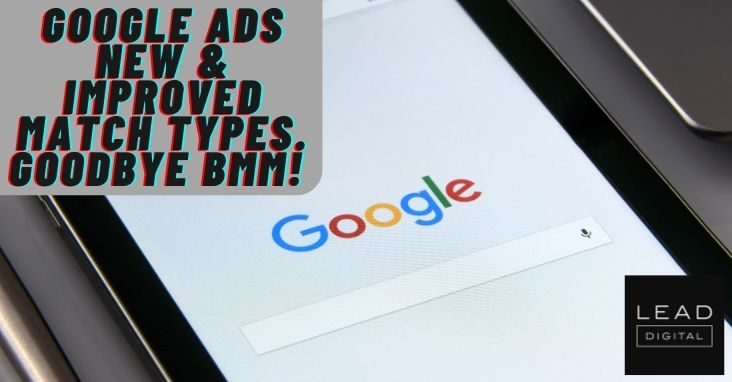
Google recently announced the next evolution in its Keyword Match Types. In February 2021 we said “goodbye” to BMM and “hello” to the new & improved Phrase Match Type. In addition, Exact Match is more powerful and predictable, and Broad Match now considers more signals which should reduce the number of irrelevant search queries. Over the past few years Google has accelerated the pace of change to keywords. In exchange for taking away the control that Match Types once offered, Google continues to push solutions with better automation to help make decisions in auctions for advertisers. Today we explore what these changes mean and what you need to do about them.
What’s changed to Match Types?
Overall, Google has made 3 changes to simplify Match Types:
- Broad Match Modifier (BMM) is dead. This is being absorbed into an evolved version of Phrase Match.
- Exact Match becomes more predictable. Similar to how it used to be.
- Broad Match should now deliver less irrelevant search queries due to the addition of new signals intended to deliver better relevance for the advertiser and user.
What does this mean?
Long term, Less time managing keywords. Short term, you’re going to be busy restructuring
Both BMM and Phrase tend to cover some of the same use cases. By sunsetting BMM, it makes accounts easier to manage. Long term, it will require a shift in Best Practice from the use of BMM to Phrase Match, so we’ll probably be spending most of the first half of 2021 restructuring accounts to accommodate these changes.
How will Phrase Match change?
Let’s explore the example that Google provided us. If you are currently targeting +moving +services +NYC +to +Boston as a Broad Match Modifier keyword you may appear against the search query “moving services NYC to Boston”. What’s annoying about BMM for this example is that it can also target “moving services Boston to NYC”. Obviously the intent is completely different here as it’s the opposite direction. This could serve irrelevant ads which reduce performance efficiency.
Of course, you should have the correct account structure and negative keywords in place to eliminate this with BMM. This creates granular approaches to accounts and ultimately gives advertisers a lot of control which Google thinks breeds bad practice for effective automation.
To combat this, the updated Phrase Match will continue to respect the word order which means much simpler account setups.
Credit: Google Ads Help, 2021
With Phrase Match in the above example, the direction in the keyword will match the search query with the same intent. Here’s some more examples that Google has highlighted will take place after this update:
Credit: Google Ads Help, 2021
Broad Match becomes more relevant
It’s a slight change, but it’s pretty impactful for Broad Match. Historically, Broad Match has always been “too broad” which would sometimes see advertisers targeting irrelevant search queries. This update will add in additional signals within the match type criteria which should improve both quality and relevance of the search queries.
An example of one of the signals is the Landing Page. Landing Pages will now be used as a sign to better qualify the relevance to a given search query. Think of it almost like how Dynamic Search Ad targeting acts today – without the dynamic ads.
Exact Match is more powerful
Google is making changes to Exact Match too by making it more precise. Other Match Types, or even close variants with a higher Ad Rank, will no longer compete with a query that is identical to the Exact Match. Put simply, search queries that exactly match the Exact Match keyword will always be preferred over other Match Types and variants. This is definitely a good thing. – Read more
#GoogleAds
Read more articles about Google Ads here



